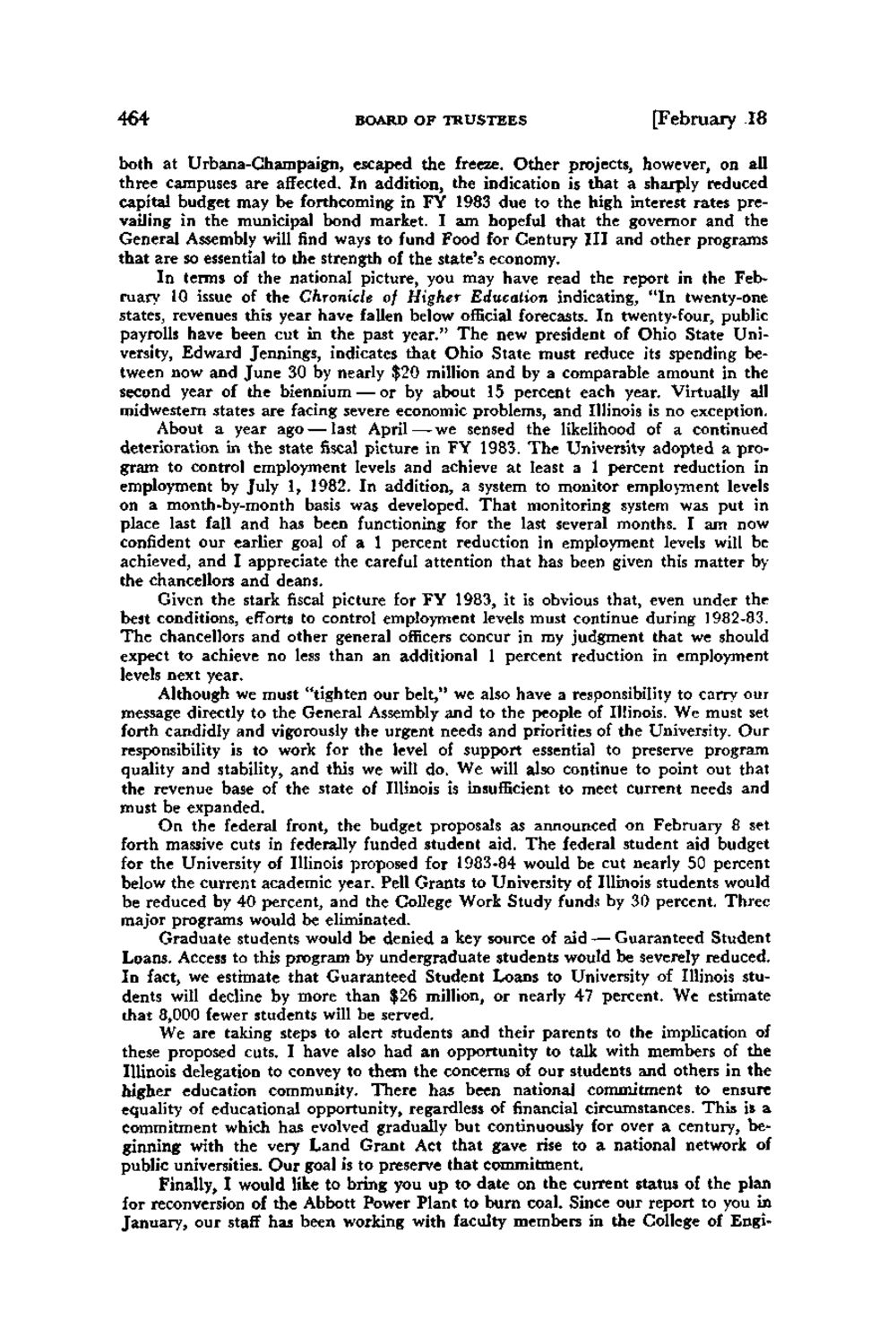| |
| |
Caption: Board of Trustees Minutes - 1982
This is a reduced-resolution page image for fast online browsing.

EXTRACTED TEXT FROM PAGE:
464 BOARD OF TRUSTEES [ F e b r u a r y .18 both at Urbana-Champaign, escaped the freeze. Other projects, however, on all three campuses are affected. In addition, the indication is that a sharply reduced capital budget may be forthcoming in FY 1983 due to the high interest rates prevailing in the municipal bond market. I am hopeful that the governor and the General Assembly will find ways to fund Food for Century I I I and other programs that are so essential to the strength of the state's economy. In terms of the national picture, you may have read the report in the February 10 issue of the Chronicle of Higher Education indicating, " I n twenty-one states, revenues this year have fallen below official forecasts. In twenty-four, public payrolls have been cut in the past year." T h e new president of Ohio State University, Edward Jennings, indicates that Ohio State must reduce its spending between now and June 30 by nearly $20 million and by a comparable amount in the second year of the biennium — or by about 15 percent each year. Virtually all midwestern states are facing severe economic problems, and Illinois is no exception. About a year ago — last April — we sensed the likelihood of a continued deterioration in the state fiscal picture in FY 1983. T h e University adopted a program to control employment levels and achieve at least a 1 percent reduction in employment by July 1, 1982. In addition, a system to monitor employment levels on a month-by-month basis was developed. That monitoring system was put in place last fall and has been functioning for the last several months. I am now confident our earlier goal of a 1 percent reduction in employment levels will be achieved, and I appreciate the careful attention that has been given this matter by the chancellors and deans. Given the stark fiscal picture for FY 1983, it is obvious that, even under the best conditions, efforts to control employment levels must continue during 1982-83, T h e chancellors and other general officers concur in my judgment that we should expect to achieve no less than an additional 1 percent reduction in employment levels next year. Although we must "tighten our belt," we also have a responsibility to carry our message directly to the General Assembly and to the people of Illinois. Wc must set forth candidly and vigorously the urgent needs and priorities of the University. Our responsibility is to work for the level of support essential to preserve program quality and stability, and this we will do. We will also continue to point out that the revenue base of the state of Illinois is insufficient to meet current needs and must be expanded. On the federal front, the budget proposals as announced on February 8 set forth massive cuts in federally funded student aid. T h e federal student aid budget for the University of Illinois proposed for 1983-84 would be cut nearly 50 percent below the current academic year. Pell Grants to University of Illinois students would be reduced by 40 percent, and the College Work Study funds by 30 percent. Three major programs would be eliminated. Graduate students would be denied a key source of aid — Guaranteed Student Loans. Access to this program by undergraduate students would be severely reduced. In fact, we estimate that Guaranteed Student Loans to University of Illinois students will decline by more than $26 million, or nearly 47 percent. We estimate that 8,000 fewer students will be served. We are taking steps to alert students and their parents to the implication of these proposed cuts. I have also had an opportunity to talk with members of the Illinois delegation to convey to them the concerns of our students and others in the higher education community. There has been national commitment to ensure equality of educational opportunity, regardless of financial circumstances. This is a commitment which has evolved gradually but continuously for over a century, beginning with the very Land Grant Act that gave rise to a national network of public universities. Our goal is to preserve that commitment. Finally, I would like to bring you up to date on the current status of the plan for reconversion of the Abbott Power Plant to burn coal. Since our report to you in January, our staff has been working with faculty members in the College of Engi-
| |